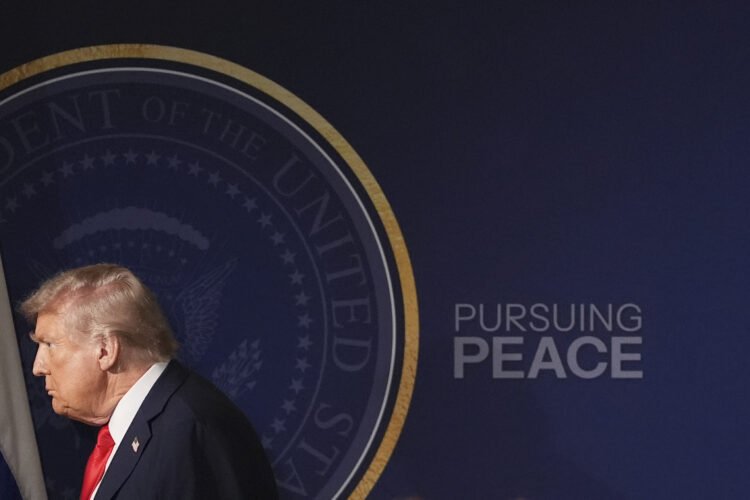Now Reading: 3 takeaways from the NBC News Decision Desk poll: From the Politics Desk
-
01
3 takeaways from the NBC News Decision Desk poll: From the Politics Desk
3 takeaways from the NBC News Decision Desk poll: From the Politics Desk

Welcome to the online version of From the Politics Desk, an evening newsletter that brings you the NBC News Politics team’s latest reporting and analysis from the White House, Capitol Hill and the campaign trail.
In today’s edition, Scott Bland breaks down the key findings from the new NBC News Decision Desk poll. Plus, we have the latest updates from the Israel-Iran conflict and the Minnesota shooting.
Sign up to receive this newsletter in your inbox every weekday here.
— Adam Wollner
3 takeaways from our new poll
By Scott Bland
The new NBC News Decision Desk Poll powered by SurveyMonkey out this weekend painted a vivid picture of where Donald Trump’s presidency stands right now — and where it’s going in the near future. Here are three takeaways from the numbers.
There’s a reason why the White House wants to focus on immigration, though it’s still a divisive issue. Trump’s overall approval rating among U.S. adults stands at 45% approve, 55% disapprove — the same as in April. The survey also tested views of how Trump is handling a number of issues, with negative verdicts on all except immigration and border security. (The poll was mostly conducted before Trump deployed the National Guard and Marines in Los Angeles in response to protests over ICE raids there.)
But while immigration is where Trump’s standing is strongest, the public is still split over his handling of the issue: 51% approve, 49% disapprove. And other polling has shown big variations in those numbers when people are asked specifics about immigration, the border and deportations.
A Republican divide over priorities in the “big, beautiful bill.” When we broke down one question on Trump’s legislative agenda by partisan affiliation, one practically even split stood out: 40% of Republicans said their most important priority in the massive domestic policy bill is reducing national debt, while 39% said continuing and expanding Trump’s tax cuts was most important.
That mirrors the argument happening among a handful of Republican senators right now that could be critical for how the final bill comes together.
Both parties get bad grades on honesty. Americans, especially independents, have a dim view of politicians’ honesty right now. And the ratings aren’t particularly great even when people are considering their own party, either. It’s one big reason why we’re seeing political instability, division, anti-incumbent sentiment and a thirst for outsiders or new voices not just in the U.S. but in elections around the world. And that’s a key factor to keep in mind as we approach primaries in 2026 — and 2028.
Read more from our poll:
How Trump went from opposing Israel’s strikes on Iran to reluctant support
By Courtney Kube, Gordon Lubold, Carol E. Lee and Katherine Doyle
President Donald Trump had opposed Israeli military action against Iran, favoring negotiations over bombing. But in the days before the strikes began, he became convinced that Israel’s heightened anxiety over Iran’s nuclear enrichment capabilities was warranted.
After a pivotal briefing from the chairman of the Joint Chiefs of Staff, Air Force Gen. Dan Caine, on Israel’s plans and U.S. options for supporting its operation, he gave tacit approval to Israel to have at it and decided to provide limited U.S. backing.
When Caine briefed him on June 8, Trump was increasingly frustrated with Iran for not responding to the latest proposal for a nuclear deal. He still remained hopeful that his Middle East peace negotiator, Steve Witkoff, who had been scheduled to conduct another round of peace talks in the region Sunday, could soon get an agreement over the line.
Trump was also facing private pressure from longtime allies who advocate more isolationist policies and wanted him to stop Israel from taking military action or at least withhold U.S. support for any such operation.
This account of Trump’s thinking leading up to the Israeli operation is based on interviews with five current U.S. officials and two Middle Eastern officials, as well as two people with knowledge of the deliberations, two former U.S officials familiar with the deliberations and a Trump ally.
Read more →
Catch up on our latest reporting on the Middle East conflict:
Suspect who terrorized Minnesota’s political leaders after deadly shooting has been arrested
By Dennis Romero
The suspect wanted in the slaying of a Minnesota lawmaker and her husband, as well as in the shooting of a state senator and his wife, was found Sunday night armed and crawling in a field in a sparsely populated stretch of Minnesota, authorities said.
Minnesota Gov. Tim Walz announced Vance Boelter’s capture at a news conference after saying Saturday that the suspect’s alleged crimes included a “politically motivated assassination.” Despite being armed, authorities said, Boelter was taken into custody without incident, and no injuries were reported.
“After a two-day manhunt, two sleepless nights, law enforcement have apprehended” the alleged shooter, Walz said.
“This cannot be the norm. It cannot be the way that we deal with our political differences,” he added.
Boelter is in custody and is now facing state and federal charges in connection with the Saturday slaying of Democratic Minnesota state Rep. Melissa Hortman and her husband, Mark, and the shooting of state Sen. John Hoffman and his wife, Yvette Hoffman, authorities said.
Read more →
Catch up on our latest reporting on the Minnesota shooting:
🗞️ Today’s other top stories
- 🤝 At the G7: Trump held a meeting this morning with Canadian Prime Minister Mark Carney as he hopes to reach new trade deals at the summit. Read more →
- 🔵 Blue-city crackdown: Trump told reporters that he wants Immigration and Customs Enforcement to target major cities, singling out New York, Los Angeles and Chicago. Read more →
- ⚖️ SCOTUS watch: The Supreme Court ordered a lower court to reconsider a religious challenge to a New York state requirement that employers provide health care plans that include abortion coverage. Read more →
- 🥾 A dangerous trek: Even as the flow of migrants has dropped significantly, many are still trying to reach the U.S., and smugglers are taking them along more dangerous routes. Read more →
- 🚫 Pardon me: A White House official told NBC News that “no pardon is being discussed” for former Sen. Robert Menendez, D-N.J., who is set to report to prison tomorrow to start an 11-year sentence for his bribery and corruption convictions. Read more →
- 📱 Trump’s calling: Trump’s business organization has announced the creation of a new wireless phone service that will carry the president’s name and a gold-colored smartphone. Read more →
- Follow live politics coverage →
That’s all From the Politics Desk for now. Today’s newsletter was compiled by Adam Wollner and Dylan Ebs.
If you have feedback — likes or dislikes — email us at politicsnewsletter@nbcuni.com
And if you’re a fan, please share with everyone and anyone. They can sign up here.
















































